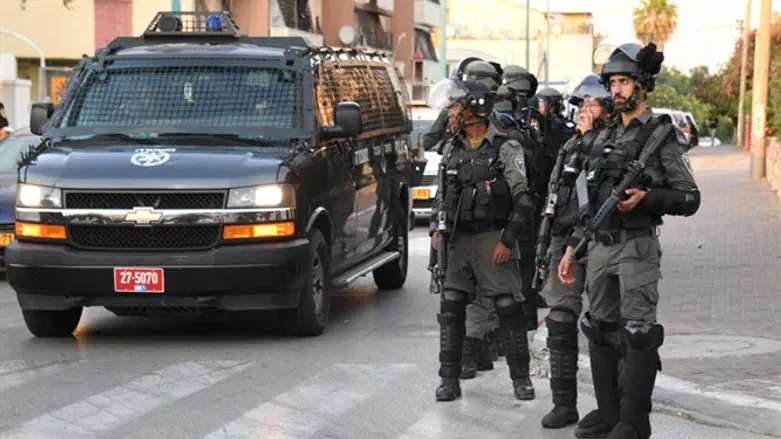
“We were verging on a state of anarchy. And we absolutely must not assume that the recent events we saw in the mixed cities are now behind us – that it’s over. The current state of calm is an illusion, and a temporary one at that. When the explosive-filled barrel of Jews against Arabs ignites again, I fear that there will be gunfights on the streets, with civilians shooting at police and Border Police.”
These are the words of Border Police Commander Amir Cohen in an interview with the Israel Hayom newspaper. He admits that, “obviously, this is a nightmare scenario, but the possibility of it occurring gives me no peace. We are not the army, facing a known enemy. We’re police officers who have to confront civilians.”
In this, his first interview since taking on the position, three months ago, Cohen speaks openly about the first hours of the riots in the mixed cities, and admits that the police should have been on the spot right from the beginning.
“It wasn’t the fault of the police that the rioting broke out, and we didn’t cause the vandalism, the killings, or the lynches,” he says. “But I admit that during the initial hours of the riots, the results weren’t good. All the same, we need to look at the broader picture. On the same day, tens of thousands of rioters flooded the streets of Lod, Akko (Acre), Jerusalem, Haifa, Jaffa, Bat Yam, Umm al-Fahm, and even if we’d had hundreds more police officers trying to bring things under control, we still wouldn’t have been able to address every incidence of violence. The capabilities of the police and Border Police are limited when it comes to incidents of such a size and intensity and geographical spread and certainly with the size of the forces available at the time, it was simply not possible to bring matters under control at that point.”
Ultimately, 20 reserve units of Border Police were recruited in order to regain control of the streets. “We succeeded, in a very short space of time, in dousing the flames,” he says.
“I’m not going to get into whose fault it was, and what caused what, but what happened was on a countrywide level. It wasn’t something that the police could have dealt with even if we’d had another 5,000 officers available. We didn’t manage things so well at first – it took time – but once we got there, we gained control of the situation,” he claims. “We arrested more than 1,500 suspects and we are still active, making more arrests every night.”
According to Cohen, the police were taken by surprise by the depth of hatred felt by Arab-Israelis toward them.
“I am extremely disturbed by the physical violence directed toward police,” he says. “The rioters seemed to be actively seeking to enter into battle against us, and I don’t recall anything like that in the past, not on such a scale. We need to bring this out into the open and address it – it’s a nationalistic element that is very disturbing.”
“We’re not the IDF – we don’t expect to be fighting against an enemy in the way they are. I didn’t expect to see Israeli citizens – even if they are Arabs – to aim weapons against law enforcement officers. I’ve seen a lot of fury in demonstrations in the past, sometimes directed at innocent civilians, and I fear that next time around, the civilians living in the mixed cities are liable to take the law into their own hands.”
Asked to comment on recent TikTok videos that have been circulating, showing Arab-Israelis trying to provoke Border Police – who do not respond – Cohen says that there is no other way of dealing with such a phenomenon.
“We can’t fight things like that,” he says. “We know exactly what we want, and no one can confuse us on that. We have a lot of power and our ability to use it wisely is our strength. We don’t want to see people killed following interactions between police and civilians. So they made a ‘V’ sign in front of us. I don’t like it, and it makes me sick to the stomach no less than it makes you, but what can you do?”